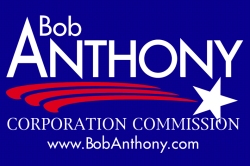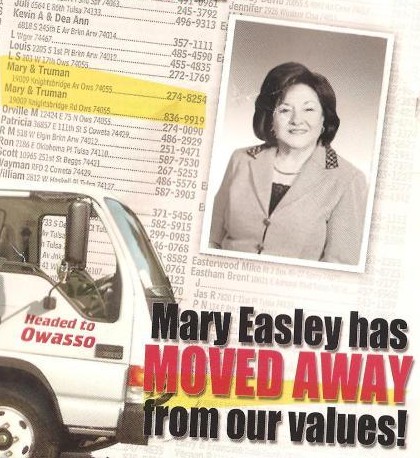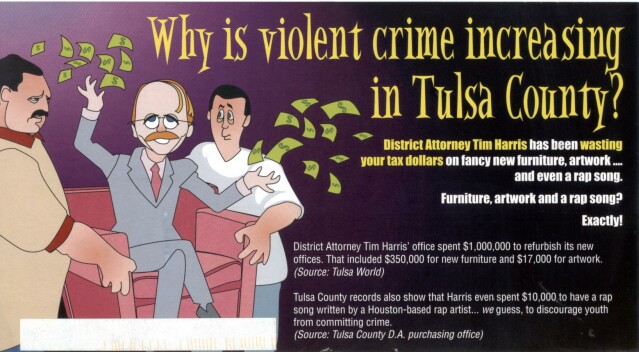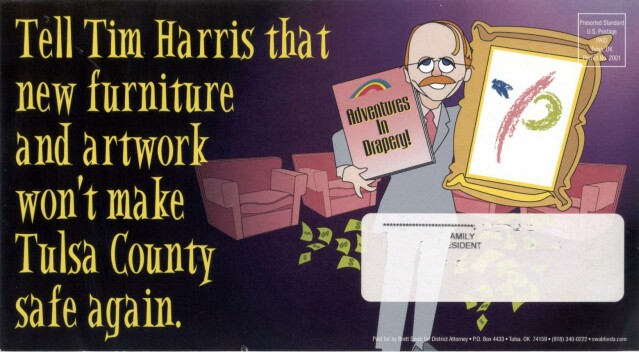
There's one statewide race that ought to matter more than any other to Oklahoma voters. That's the race for a seat on the Oklahoma Corporation Commission. In addition to overseeing Oklahoma's oil and gas industry, the OCC regulates public utilities like PSO, ONG, and AT&T (formerly Southwestern Bell).
Considering the amount of money at stake in the OCC's decisions on utility rates, the commission is ripe for corruption. And indeed, in the late '80s and early '90s, the FBI investigated bribery allegations involving the OCC. Corporation Commissioner Bob Hopkins, a Democrat, was convicted of bribery and sent to jail, as was utility lobbyist Bill Anderson. The culture of corruption at the OCC was cracked open because, in 1989, a newly-elected commissioner went to Feds when Anderson offered him cash.
That commissioner was Bob Anthony, a man of honesty and fairness. In Anthony, Oklahoma's utility ratepayers have someone who is looking out for their interests. Regulated companies, whether large or small, get a fair shake from Bob Anthony.
In 1995, Bob Anthony received an award from the FBI for his involvement in the corruption investigation. (Click that link for the text of his commendation.)
During his campaign, an attorney who practiced before the Commission greeted him with a handshake that contained an envelope with ten $100 bills. Mr. Anthony contacted the United States Attorney's office and agreed to participate and work with the FBI as a cooperative and covert witness. He knew at that time that his role would certainly be revealed at trial, and that the eventual proceedings in court might damage his ability not only to be a public servant, but to work in any public service career in the state of Oklahoma. The investigation which he caused, supported and worked in lasted approximately six years. Evidence which he developed involved illegal payments of $10,000. He made over 150 tape recordings that helped broaden the scope of the case to include another fellow commissioner and a local telephone company.
By 1992, word of the investigation and Mr. Anthony's cooperation had reached the news media. Determined to meet his duty as an elected public servant, he publicly commented on the case, explaining his part, but only to the extent required to fulfill his public duties. As a result of his inability to comment fully on the case, because he intended to protect the integrity of the investigation, the press had a field day with respect to him and his own reputation. For over two years he was featured as a "snitch" and a political opportunist, as well as being the subject of several leading cartoonists for the media. It wasn't until the case went to trial in 1994 that the full story was revealed and Mr. Anthony was vindicated when the full facts of his cooperation, dedication and sacrifice were announced in a public forum. In the interim, his campaign for a seat in the United States House of Representatives was defeated and he only narrowly won reelection to the Commission itself.
In the end, two subjects were convicted of bribery, and a clear message was sent to the leadership of both the business and political communities of Oklahoma that such conduct would not be tolerated. Mr. Anthony, by this award, joins a very select group of awardees who exemplify the tremendous courage and sacrifice that people have shown--particularly people who have put themselves and their families' welfare at jeopardy to do the right thing to support an investigation. That is a critically important commitment--when one puts his own life and welfare directly on the line. It is only with that premise and support and cooperation that the FBI, or any law enforcement organization, can do the job it is supposed to do, which is protect the people.
In 2000, Anthony was elected to a third term with the highest number of votes in Oklahoma history. This year, he's being challenged by former Corporation Commissioner Cody Graves.
Cody Graves is a big baby. In January 1995, a pay raise approved by the Legislature for elected officials went into effect, but under the Oklahoma Constitution, a pay raise isn't allowed to go into effect in the middle of an executive officer's term. Corporation Commissioner's terms are six years, staggered so only one is up for election every two years. Anthony asked for and received an Attorney General's opinion clarifying that the Legislature could not nullify that provision of the Constitution. The ruling meant that Graves would not get the raise until January 1999. (Anthony would not be eligible until January 2001.)
Graves was so angry at the ruling he quit. Graves then became a lobbyist for the very companies he had been regulating.
So what do you think, Oklahoma? Shall we replace a man of principle and courage with someone who is evidently motivated by money above all else?
I was disgusted, but not surprised, to learn today that Graves has been endorsed by former Corporation Commissioners J. C. Watts and Ed Apple, both Republicans, along with all other living former commissioners, all Democrats. (Presumably Commissioner Hopkins, the convicted felon, is dead and could not be reached for comment.) Given that Democrat former commissioners were in office when the culture of corruption was in full swing, it's no wonder that they'd want Anthony out of office, since his courage put a stop to the walking-around money. During Apple's time in office, he was a consistent vote for whatever the utilities and the big energy companies wanted.
As for J. C. Watts, a web search turned up this about Watts' election to and tenure on the Corporation Commission. On March 1, 1991, the FBI recorded a phone conversation between Watts and Bill Anderson, then representing the interests of independent telephone companies. This was at a time when Bob Anthony was pushing for 35-mile toll-free calling zones in each of Oklahoma's metro areas, a move opposed by these small-town phone companies who derived a lot of revenue from town-to-town tolls. In the conversation, Anderson discusses arrangements for delivering $1,500 to Watts, in advance of a March 6 cutoff for campaign contributions to his 1990 campaign account. Anderson had a practice of bundling cash contributions with a long enough list of names that it could be claimed that each name had given $200, the threshold for public reporting of a campaign contribution.
Watts was with State Rep. Kevin Cox that day:
Anderson said "And hell, I'll just, if he's with you, you just come to the door and I'll just hand you the cash. Kevin needn't know. You, just tell him you need to come by and get a message from me or something."
Later that day, FBI agents observed Watts coming to Anderson's house. Watts told the FBI that he didn't recall picking up a contribution from Anderson. Perhaps he was borrowing a cup of sugar.
The good ol' boys, Republicans and Democrats alike, aren't happy that there's someone on the Corporation Commission who has this as his mission statement:
On January 9, 1989 I accepted a position of public trust and took a constitutional oath to enforce the law, supervise rates, correct abuses, and prevent extortion and discrimination by regulated companies.
The rest of us, Republicans and Democrats alike, need to give Bob Anthony another six-year term to look out for our best interests.
MORE:
Here is a PBS Frontline interview with Bob Anthony about his cooperation with the FBI in the Corporation Commission bribery investigation.
(Anthony makes reference in the interview to a case before the commission involving Nora and Eugene Lum, associates of Bill Clinton, and the main subjects of the Frontline episode. Here are statements from Nolanda Butler Hill and Stephen Dresch about the case, which connects to late Commerce Secretary and DNC chairman Ron Brown, Clinton adviser Mack McLarty, and one-time Democratic 1st District congressional candidate Stuart Price.)
Here is a table showing the membership of the OCC since statehood.
Here's a 1999 article by, of all people, Oklahoma Observer editor Frosty Troy, detailing Anthony's achievements.
(I have to take issue with the comparison of Anthony to Henry Bellmon. Anthony is beloved by grassroots Republicans, while Bellmon earned their distrust on issues like the Panama Canal and higher taxes. Anthony gets standing ovations, not boos or hisses, at Republican conventions.)
Anthony's website includes a sweet trip down memory lane, recalling his first campaign in 1988, traveling Oklahoma accompanied by his wife and four school-aged daughters.


 This is the defense that was often employed by a fictional man in uniform, Sgt. Hans Schultz of Luftstalag 13:
This is the defense that was often employed by a fictional man in uniform, Sgt. Hans Schultz of Luftstalag 13: 


